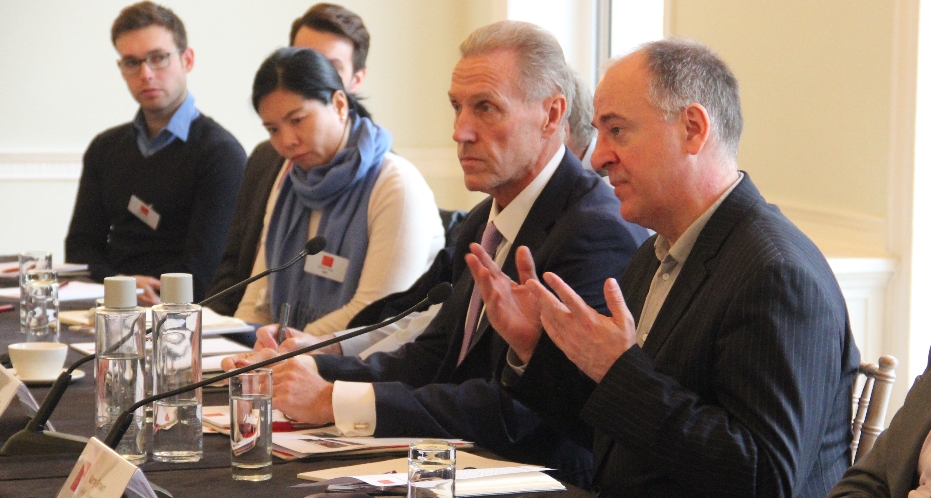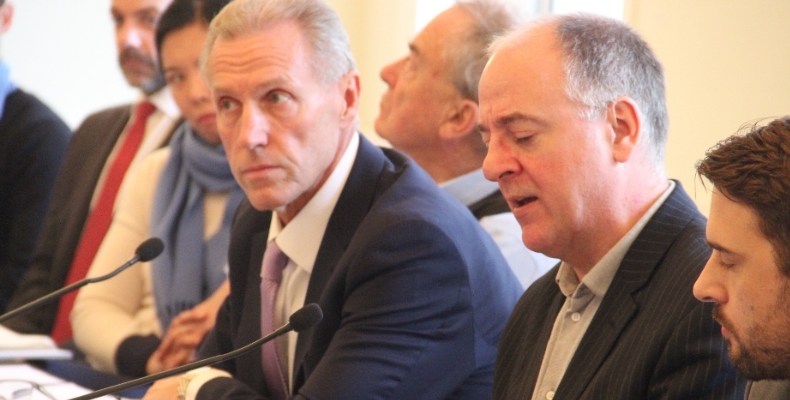Driving commercial and political engagement between Asia, the Middle East and Europe
Driving commercial and political engagement between Asia, the Middle East and Europe
Driving commercial and political engagement between Asia, the Middle East and Europe

US president-elect Donald Trump’s advisors have apparently worked out that the only thing the US can hurt China on is Taiwan, says the Professor of Chinese Studies and Director of the Lau China Institute at King’s College in London Kerry Brown.
Mr Trump appeared to set a new direction for US-China relations when he spoke by telephone with Taiwan’s president Tsai Ing-wen last week becoming the first US president or president-elect who has spoken to a Taiwanese leader since 1979 when the US embraced the One China policy and severed diplomatic ties with Taiwan.
Following the phone call, Mr Trump tweeted a series of tweets accusing China of currency manipulation, unfairly taxing US products and of “building a massive military complex in the middle of the South China Sea.”
Donald Trump, China and Taiwan
“Trump has done it in that instinctive way that he gets under the skin of his opponents. He has picked the one point that is really going to affect the Chinese: Taiwan,” Mr Brown explained at a briefing held at Asia House on Tuesday morning to discuss President Xi’s leadership and goals, which was attended by Asia House corporate members and invited guests.
Whilst China was seeking reunification with Taiwan, “90 per cent or more people in Taiwan have a very strong antagonism to this,” Mr Brown, who is an Associate Fellow on the Asia Programme at Chatham House, said.
Mr Brown surmised that China would not use military force to achieve reunification with Taiwan, but would instead use economic leverage since 70 per cent of Taiwan’s economy comes from trade with China. China meanwhile would also “more aggressively talk about the reunification framework,” he predicted.
He warned if there was ambiguity in the international community’s reaction to this, China might be more hungry to push through its “resurrection of the Chinese nation“ concept.
The South China Sea is critical to China’s ambitions to scope out a territory with China at its centre, he said. “It’s tough to think Chinese leadership could compromise on this. China is all about the ‘one country, one system’ and stability of the great nation,” Mr Brown said.
‘Trump entertainment’
“There will be no need to watch films or read books over the next four years as we will all be entertained by Trump,” Mr Brown then went on to say.
“Chinese President Xi Jinping will see Trump’s election as opening up spaces, as the Chinese create spaces they want to develop influence over. They also see Trump as a businessman and that maybe a deal is available,” he said.
Under Mr Trump, the US appears likely to review its security arrangements in Asia. So, what is the Chinese vision for the international system which has until now been underpinned by US values, Mr Brown asked in the briefing.
“If the USA is retrenching, what are the values that China will propose to replace the US values? There will be a tremendous challenge or opportunity for Xi Jinping to get it right. If they don’t get it right, this could be a moment when China gets exposed as a nation state that does not go beyond its own borders,” Mr Brown stated.
The end of the TPP
Mr Trump has already said he will withdraw from the Trans-Pacific Partnership (TPP), which excludes China, from day one in office. That effectively means the large 12-nation trade deal, which has taken eight years to negotiate, will collapse opening up opportunities for China to take a more dominant role in global trade negotiations.
Asian countries are now eyeing up the Regional Comprehensive Economic Partnership (RCEP), a free trade deal between ASEAN and the six states with which ASEAN has existing FTAs, which has been under negotiation since 2013.
“There is a lot of space for growth in China and it is likely there will be activity by China to create free trade in Asia. After the UK exits the EU there will be new opportunities. The EU won’t so easily do a deal with free trade zones in Asia, but the UK might,” Mr Brown said.
So what are Xi Jinping’s main ambitions?
“Xi Jinping is immensely powerful,” Mr Brown explained. “He is not hugely interested in the Chinese economy, apart from as much as it helps to make one-party rule sustainable which he sees as his principle mandate. That is why he has put a lot of focus on his anti-corruption struggle and creating a leaner, meaner political machine pulling back the squirrelling away of state money to state-owned enterprises in China,” Mr Brown said.
He said in President Xi’s mind, China was poised to “deliver modernity” for the first time in its history, “sliding off the humiliation of becoming a secondary player” and now becoming a dominant player in Asia.
Mr Brown said that whilst the middle classes in China didn’t necessarily believe in the ideology of the Chinese Communist Party (CCP), most did believe in the stability of the Party and “liked growth.”
“If growth falls too much then nationalism will ratchet it up,” he said.
“Xi has used the nationalistic message to do what he has done so far and prove that one-party rule is sustainable,” he said.

Chief Executive of Asia House Michael Lawrence is pictured next to Professor of Chinese Studies and Director of the Lau China Institute at King’s College in London Kerry Brown at the briefing
President Xi’s foreign trips
He pointed out that President Xi had travelled extensively since being president in 2013 to 45 countries. “He has not been to Japan since 2012 or North Korea,” he said.
“The only sensible thing Trump has said about foreign policy is that China should sort the North Korean issue out. The amount of aid and energy they supply, they can deal with that. There will be intense pressure on China to take a proactive position on North Korea,” he explained.
“Xi has not been to Japan since 2012 and Abe has not had a bilateral with China. This is a priority now,” he said.
“But Xi has been to the USA three times and Russia four times,” he said, explaining there was a strong link between his foreign trips and what he wants to achieve domestically.
He pointed out that China’s Belt and Road initiative, with its vision of large-scale mining and infrastructure projects, seemed to be interfering in Russia’s interests. And he said that China’s interest in the Middle East was also growing.
“Yes, China has a strategic partnership with Russia, but it has strategic partnerships with lots of countries. It does not mean a great deal. China wants to get more dominance via economic leverage,” he said.
“The Russian economy is a fifteenth the size of China’s, so it can’t do much. There is no significant issue between the two countries at the moment. Over the next five to 10 years it will all become clear,” he added.
“The Belt and Road is being presented as an area of economic commonality around China. There are not a huge number of projects at the moment. It’s fairly abstract but whilst it is a fairly self-interested project, we should welcome the fact that China is being more expressive about its foreign policy,” he stated.
As for the internationalisation of the RMB, he said that China was caught between wanting to control its domestic economic policy and wanting to increase the internationalisation of the RMB without massive globalisation.
“There are people in China with vested interests who don’t want liberalisation too quickly, so this has not been resolved, but it could be resolved if more liberal figures were appointed to the top body of the Communist Party at the 19th National Congress in 2017,” he said.
“However, the ideological differences about the role of the market have been there for a long time – so are not going to get resolved soon,” he added.
But he said the types of people that President Xi appoints – whether associated with state-owned enterprises or whether supporting marketization – would give a good sense of Xi’s programme ahead.
After the National Congress in 2017 there could even be a reduced politburo and there may not be an obvious successor to Xi Jinping, he added.
Asia House corporate members represented at the briefing with Kerry Brown included Nikkei, Mitsui & Co Europe, McKinsey & Company, G3, GSK, Jardines, Linklaters, Shell International, Kroll and Linklaters.
naomi.canton@asiahouse.co.uk
To find out about becoming a corporate member of Asia House email Charlie.Humphreys@asiahouse.co.uk.
To see the upcoming programme of Business & Policy events at Asia House click here.
